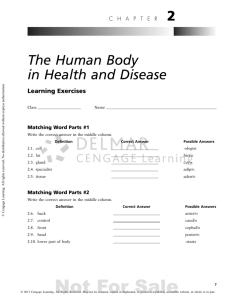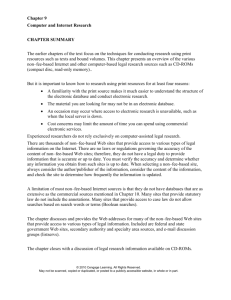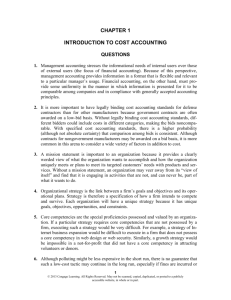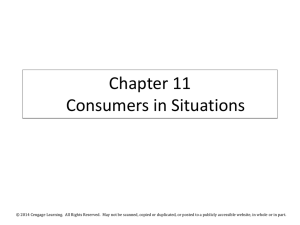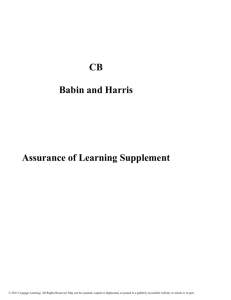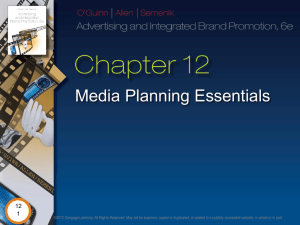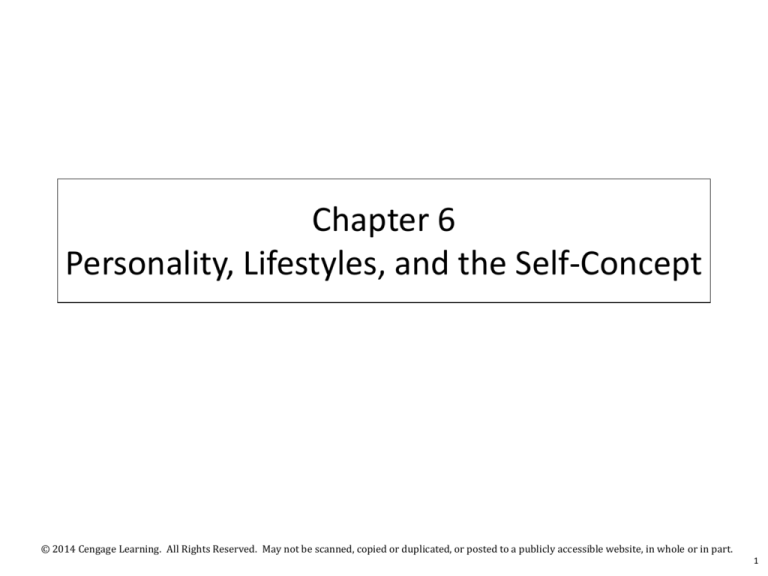
Chapter 6
Personality, Lifestyles, and the Self-Concept
© 2014 Cengage Learning. All Rights Reserved. May not be scanned, copied or duplicated, or posted to a publicly accessible website, in whole or in part.
1
Learning Outcomes
•
•
•
Define personality and know how various
approaches to studying personality can be applied
to consumer behavior
Discuss major traits that have been examined in
consumer research
Understand why lifestyles, psychographics, and
demographics are important to the study of
consumer behavior
© 2014 Cengage Learning. All Rights Reserved. May not be scanned, copied or duplicated, or posted to a publicly accessible website, in whole or in part.
2
Learning Outcomes
• Comprehend the role of the self-concept in
consumer behavior
• Understand the concept of self-congruency
and how it applies to consumer behavior
issues
© 2014 Cengage Learning. All Rights Reserved. May not be scanned, copied or duplicated, or posted to a publicly accessible website, in whole or in part.
Personality
• Totality of thoughts, emotions, intentions, and
behaviors that a person exhibits consistently
as he or she adapts to his or her environment
© 2014 Cengage Learning. All Rights Reserved. May not be scanned, copied or duplicated, or posted to a publicly accessible website, in whole or in part.
Personality Qualities
• Unique to an individual
• Can be conceptualized as a combination of
specific traits or characteristics
• Traits are relatively stable and interact with
situations to influence behavior
• Specific behaviors can vary across time
© 2014 Cengage Learning. All Rights Reserved. May not be scanned, copied or duplicated, or posted to a publicly accessible website, in whole or in part.
Psychoanalytic Approach
• Applicable to both motivation and personality
inquiry
– Id - Focuses on pleasure-seeking and immediate
gratification
– Superego - Works against the id by motivating
behavior that matches societal norms and
expectations
– Ego - Focuses on resolving the conflicts between
the id and the superego
© 2014 Cengage Learning. All Rights Reserved. May not be scanned, copied or duplicated, or posted to a publicly accessible website, in whole or in part.
Motivational Research Era
• Researchers utilized tools such as depth
interviews and focus groups to improve their
understanding of inner motives and needs
© 2014 Cengage Learning. All Rights Reserved. May not be scanned, copied or duplicated, or posted to a publicly accessible website, in whole or in part.
Trait Approach to Personality
• Trait - Distinguishable characteristic that
describes one’s tendency to act in a relatively
consistent manner
• Multiple approaches available for consumer
researchers
© 2014 Cengage Learning. All Rights Reserved. May not be scanned, copied or duplicated, or posted to a publicly accessible website, in whole or in part.
Multiple Approaches to Personality
•
•
•
•
Nomothetic perspective
Idiographic perspective
Single-trait approach
Multiple-trait approach
© 2014 Cengage Learning. All Rights Reserved. May not be scanned, copied or duplicated, or posted to a publicly accessible website, in whole or in part.
Important Traits Studied
•
•
•
•
•
•
•
Value consciousness
Materialism
Innovativeness
Need for cognition
Complaint proneness
Competitiveness
Self-monitoring
© 2014 Cengage Learning. All Rights Reserved. May not be scanned, copied or duplicated, or posted to a publicly accessible website, in whole or in part.
Hierarchical Approaches
• Begin with the assumption that personality
traits exist at varying levels of abstraction
– Specific traits - Tendencies to behave in very welldefined situations (e.g., bargaining proneness)
– Broad traits - Behaviors that are performed across
many different situations (e.g., extroversion)
© 2014 Cengage Learning. All Rights Reserved. May not be scanned, copied or duplicated, or posted to a publicly accessible website, in whole or in part.
Personology Approach
• Combines personality theory and motivation
– Allows consumer researchers to better understand
the uniqueness of the individual consumer
– Combines information on traits, goals, and even
consumer life stories
© 2014 Cengage Learning. All Rights Reserved. May not be scanned, copied or duplicated, or posted to a publicly accessible website, in whole or in part.
Brand Personality Appeal
• Refers to a brand’s ability to appeal to
consumers based on the human
characteristics associated with it
– Should be perceived as having strong degrees of
favorability, originality, and clarity
© 2014 Cengage Learning. All Rights Reserved. May not be scanned, copied or duplicated, or posted to a publicly accessible website, in whole or in part.
Personality and Brand Relationships
• Overall quality of such relationships can be
explained in terms of:
– Love and passion
– Self-connection
– Commitment
– Interdependence
– Intimacy
– Brand partner quality
© 2014 Cengage Learning. All Rights Reserved. May not be scanned, copied or duplicated, or posted to a publicly accessible website, in whole or in part.
Lifestyles
• Refer to the ways consumers live and spend
their time and money
– Useful in identifying viable market segments
© 2014 Cengage Learning. All Rights Reserved. May not be scanned, copied or duplicated, or posted to a publicly accessible website, in whole or in part.
Psychographics
• The way consumer lifestyles are measured
– Survey consumers using AIO statements
– Used to gain an understanding of consumers’
activities, interests, and opinions
• VALS
• PRIZM
© 2014 Cengage Learning. All Rights Reserved. May not be scanned, copied or duplicated, or posted to a publicly accessible website, in whole or in part.
Demographics
• Observable statistical aspects of populations
including such factors as age, gender, or
income
• Can be used in conjunction with
psychographic analysis
© 2014 Cengage Learning. All Rights Reserved. May not be scanned, copied or duplicated, or posted to a publicly accessible website, in whole or in part.
Self-Concept
• Totality of thoughts and feelings that an
individual has about him or her self
© 2014 Cengage Learning. All Rights Reserved. May not be scanned, copied or duplicated, or posted to a publicly accessible website, in whole or in part.
Self-Concept
• According to a symbolic interactionism
perspective:
– Consumers agree on the shared meaning of
products and symbols
• Semiotics - Study that relates to the symbolic
interactionism
– Study of symbols and their meanings
© 2014 Cengage Learning. All Rights Reserved. May not be scanned, copied or duplicated, or posted to a publicly accessible website, in whole or in part.
Self-Concept
•
•
•
•
•
•
Actual self
Ideal self
Social self
Ideal social self
Possible self
Extended self
© 2014 Cengage Learning. All Rights Reserved. May not be scanned, copied or duplicated, or posted to a publicly accessible website, in whole or in part.
Self-Concept
• Self-esteem - Positivity of an individual’s selfconcept
• Body esteem - Positivity with which one holds
their body image
© 2014 Cengage Learning. All Rights Reserved. May not be scanned, copied or duplicated, or posted to a publicly accessible website, in whole or in part.
Self-Congruency Theory
• Proposes that much of consumer behavior can
be explained by the congruence (match)
between a consumer’s self-concept and the
image of typical users of a focal product
© 2014 Cengage Learning. All Rights Reserved. May not be scanned, copied or duplicated, or posted to a publicly accessible website, in whole or in part.



